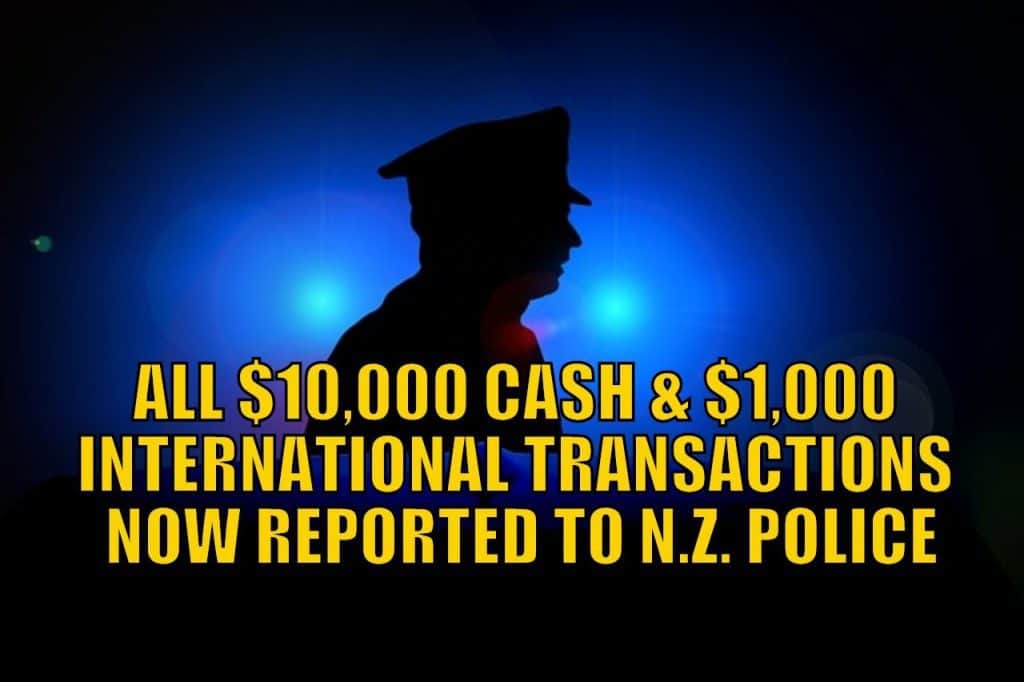Last March we wrote about the upcoming changes in financial reporting requirements in New Zealand.
New Banking rules set to come into force in November will mean any cash transactions over $10,000 will have to be reported to police by New Zealand banks.
On top of this banks will also have to alert the Police Financial Intelligence Unit of all international wire transfers from New Zealand of only $1000 or more.
The customer details given to police by the banks will include “names, account numbers, types and amounts of funds, locations, addresses, phone numbers, and “any other identifying information”.
However there was a grace period that lasted up until 30 June 2018, to allow banks to put in place systems to collect the necessary information.
But as of the weekend, this grace period is over and full reporting has begun.
NZ banks, finance and law firms now liable under new money laundering laws
Law firms, banks and financial entities will be forced to provide police with client details and information on all cash transactions over $10,000 and all international wire transfers from New Zealand of $1000, from today. The country’s banks, firms financial institutions are now liable under new money laundering and counter-terrorism financing laws following a grace period to report suspicious transactions.”
…As well as notifying police of details of the applicable cash and international wire transfers, personal information including names, account numbers, types and amounts of funds, locations, addresses, phone numbers and “any other identifying information” will also be provided to police under the new laws, which has raised privacy concerns.”
So financial privacy has eroded a little further in New Zealand as a result. The $1000 ceiling for international wire transfers is particularly harsh. We’d imagine the significant majority of international transfers are for amounts above $1000. As a result there will be mountains of transactions being reported to police each day.
We reported on the concerns over privacy last year, given this will be a massive increase in financial data that is collected and handed to authorities. Collected without any reason to suspect wrongdoing for the vast majority of these transactions.
Read more about other New Zealand financial reporting regulations and how they compare to elsewhere:
Financial Martial Law: Does NZ Have Similar Financial Reporting Regulations?
Are Precious Metals Transactions Reported in New Zealand?
So how are precious metals transactions affected by this new reporting? There is no real impact on precious metals purchases. Unless of course you make a purchase of gold or silver of more than $10,000 with cash or you wire money offshore to buy gold or silver for more than $1,000.
Anyone buying gold or silver bullion and paying via bank transfer will not be impacted.
The rather perverse result of these new financial reporting requirements is that there is more privacy now when paying by bank transfer, compared to cash transactions. If you pay by bank transfer you will not have your transaction reported to the police by default. But if you spend more than $10,000 and made payment via cash then the bank will report your transaction to the police.
Bullion dealers (such as ourselves) are currently not required to report any transactions to the police or any government department.
We’ve written about this previously. See: Privacy: Do purchases of gold and silver in NZ have to be reported?
However there is an update to this topic.
New Reporting Rules for Bullion Dealers as of 1 August 2019
Anti money laundering (AML) and counter financing of terrorism (CFT) requirements come into force from 1 August 2019 for dealers in High Value Goods. Under which Bullion Dealers are classified.
The impact of this will be that from August next year, bullion dealers accepting a cash payment (or a series of ‘related transactions’) of $15,000 or more, will need to ensure the following is undertaken:
- verification of the identity of the customer
- a record is kept of the customer’s identity and their transaction
- any identified potential signs of money laundering or financing of terrorism are reported to the Police Financial Intelligence Unit (FIU), setting out details about the transaction.
See the Ministry of Justice website for more information.
Although this is a less onerous system that many other overseas jurisdictions. For example Australia has know your customer (KYC) and customer identification procedures required for any bullion purchases over $5000. This is regardless of whether the method of payment is cash or not.
Nonetheless it is again cash transactions that are being targeted. The war on cash continues.
Read more: Why You Should Become Your Own Central Bank – Even if Your Nation’s Central Bank Has Gold Reserves


Pingback: New Financial Reporting Rules: First Step to Capital Controls in New Zealand? - Gold Survival Guide